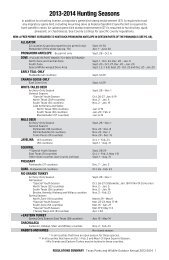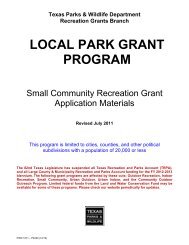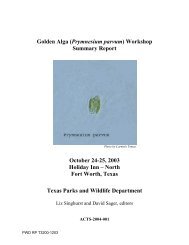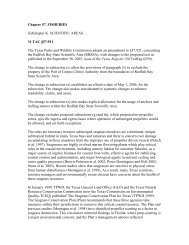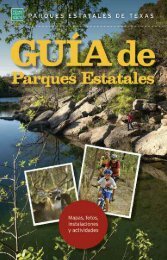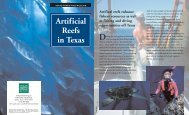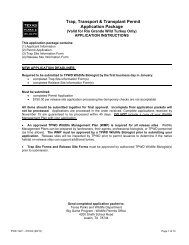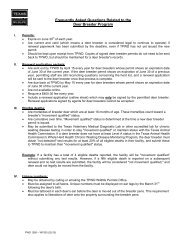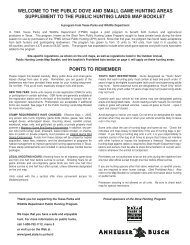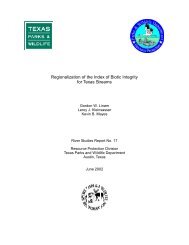1-1 Appendix 1 Responses to survey questions administered to ...
1-1 Appendix 1 Responses to survey questions administered to ...
1-1 Appendix 1 Responses to survey questions administered to ...
You also want an ePaper? Increase the reach of your titles
YUMPU automatically turns print PDFs into web optimized ePapers that Google loves.
• Personnel issues are my greatest concern. Classification structure and salaries<br />
seem <strong>to</strong> always produce ceilings and hardships in retaining well qualified<br />
employees and in recruiting well qualified employees, especially those areas of<br />
newly evolved technologies or applications. Stagnant state salaries are eroding<br />
employee’s buying power annually, and is compounded with the absence of<br />
within agency mechanisms for advancement (pay steps or long range career<br />
tracks) or reward for achievement (merit or achievement bonuses). Also, the<br />
obviously different special treatment of game wardens (higher pay, higher<br />
retirement, special privileges, and over abundance of recognition by upper<br />
management within the agency) is very demoralizing <strong>to</strong> college educated staff.<br />
• An aging work force is one of my concerns. The baby boomers, who make up a<br />
large percentage of our work force, are rapidly nearing retirement. The turnover<br />
rate at many Coastal Fisheries Division field stations has been low, thus<br />
potentially creating an experience drain when the elders retire within the next few<br />
years. Coastal Fisheries Division has not embraced or outwardly endorsed the<br />
rehire of retirees as has Inland Fisheries Division. The executive office should be<br />
concerned that Inland Fisheries Division has all of their experienced regional<br />
direc<strong>to</strong>rs on a “rehire the retiree” basis. Rehire of all reapplying retirees sends a<br />
message of “done deal” <strong>to</strong> other employees, prevents upward mobility within the<br />
ranks, and sets the stage for a mass exodus of rehires at an undeterminable time<br />
and with potentially bad consequences. Enough soap box.<br />
• Continuing education of professional as well support and technician staff is<br />
inadequate. Constraints include time (full work load), money (who has money<br />
and who pays), and upper level leadership not initiating advanced, appropriate<br />
and applicable training for staff.<br />
• Equipment and facilities are always an issue, the answer <strong>to</strong> which is more money.<br />
Minimum mileage requirements and caps of the number of trucks is a hurdle we<br />
can over come with some extensive planning, but one that would be much simpler<br />
without such tight restrictions. Facilities, both Austin and the field, are all at<br />
maximum capacity for space. There is no long range plan that I know of for<br />
currently needed and future office needs, especially in the field.<br />
• Overall, the agency seems <strong>to</strong> be in fairly decent shape <strong>to</strong> meet future scientific<br />
challenges. Strong leadership is in place <strong>to</strong> lead the way; and, plenty of resources<br />
and support are provided <strong>to</strong> scientific staff so that they can accomplish their<br />
objectives. A higher salary for scientific staff would no doubt go a long way <strong>to</strong><br />
keep the “best” people for longer periods, and possibly attract other high quality<br />
applicants.<br />
• We are in adequate shape for maintaining the current pro<strong>to</strong>cols, but we need more<br />
staff and resources <strong>to</strong> take on addition scientific data collection efforts that will be<br />
necessary for sound management in the future. Our existing staff is strong. Some<br />
of our facilities are not adequate <strong>to</strong> fulfill our mission, particularly at Port<br />
O’Connor and Perry R. Bass, and <strong>to</strong> a lesser extent at CCA/CPL MDC.<br />
• TPWD has recruited highly qualified staff and continues <strong>to</strong> train and support<br />
them. Staff expertise is a strong point.<br />
• All government bureaucracies are just that – bureaucracies; and as such are slow<br />
<strong>to</strong> redirect. The organizational structure at TPWD is changing <strong>to</strong>ward more<br />
2-5



